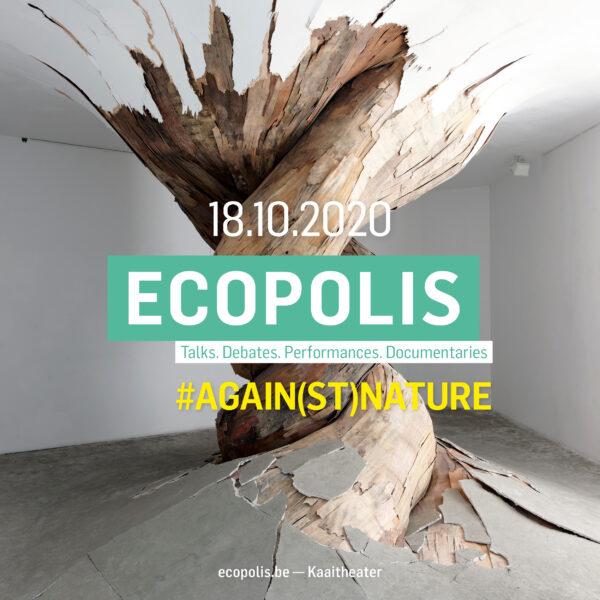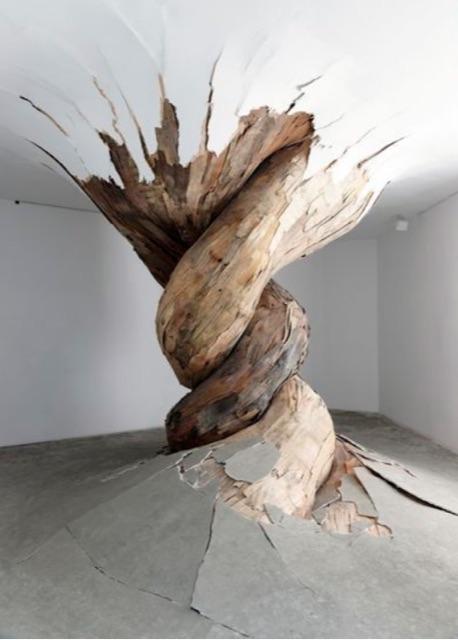Ecopolis 2020 at Kaaitheater: programme & biographies
For this sixth edition, Ecopolis is again inviting a broad range of writers, academic experts and thinkers from civil society. Reflect with them on the challenges post-corona. All debates are translated simultaneously in Dutch, French and English .
11:00 Corona lessons for a resilient society
> in Dutch
The corona crisis has taught us that you cannot just cut down forests or deal carelessly with animals endlessly. Outsourcing all production to low-wage countries is also no longer an option. How do we build resilient societies that are ecologically and socially durable?
With Myriam Dumortier, Koen Vannmechelen, Jan Rotmans and Dirk Draulans. Subsequently: spoken word intervention by Yousra Benfquih.
Myriam Dumortier is an agricultural engineer and a doctor of agricultural sciences. She is visiting professor of forest and nature policy at Ghent University. She regularly writes op-eds for Knack and Oikos Magazine, among others.
An internationally renowned artist, working across a multitude of disciplines, Koen Vanmechelen (1965) is one of the most versatile thinkers of these times. He is situated at the confluence of art, nature, science, philosophy and community. As an eternal migrant, he travels the world looking for answers to fundamental questions that touch on issues which are both timeless and acutely relevant today: identity, biocultural diversity, globalisation and human rights.
Jan Rotmans is a Dutch scientivist, a passionate and rebellious scientist and an authority in the field of transitions. In doing so, he not only examines the tilting of society, but also plays an active role in it. He wants to accelerate the transition by establishing ICIS, Urgenda, DRIFT, Nederland Kantelt and helping to set up Zorgeloos. With his knowledge, he would like to draw up the rules for how this transition can be realized and bring together fresh viewers and cross-thinkers from all corners of society to creatively reach the tipping point together.
Dirk Draulans is a doctor in biology and a well-known ornithologist. As an editor at Knack, he writes about pressing issues such as the illegal use of hormones in livestock farming, and environmental catastrophes such as the disappearance of forests worldwide. Draulans has written sixteen books, including novels and travelogues such as De Mens van Morgen, about his travels in search of the endangered bonobo in the equatorial forest of Congo.
Yousra Benfquih holds a PhD in law and is valorisation coordinator of the Hannah Arendt Institute for Diversity, Urbanity & Citizenship. She also has a great love for words: she is a writer, columnist and spoken word artist. It is in this latter capacity that she will capture the reflections during Ecopolis in poems created on the spot.
12:30 Meet the animal
> in Dutch, with a literary intervention in French
For centuries we have been intrigued by animals and have used them in our stories. Who does not know Reynard the Fox? Only recently have we learned how small the differences between humans and animals are. What does an understanding relationship with animals with recognition of their own abilities mean? A conversation that explores new paths with: Eva Meijer, Hans Van Dyck en Hendrik Schoukens. Subsequently: literary intervention by Christine Van Acker.
Dutch philosopher and writer Eva Meijer works as a postdoctoral researcher at Wageningen University on the agency of animals in the Anthropocene. Her latest novel De nieuwe rivier, a magical realist murder mystery, was published in April 2020. Other publications include her debut Het schuwste dier (2011) – nominated for the Academica Literature Prize and the Gouden Boekenuil – and When animals speak: Towards an interspecies democracy (New York University Press, 2019).
Hans Van Dyck is professor of Behavioral Biology at UCL. He is also head of the Behavioral Ecology and Nature Conservation Laboratory at Earth & Life Institute. He tries to understand the behavior of animals in a human-sized world. In addition to teaching, setting up research and publishing in international professional literature, he is also a columnist for EOS and MO *, and a regular guest on radio and television.
Hendrik Schoukens is an environmental lawyer and author. Since 2012, he has been affiliated with the Public Law department of Ghent University as a doctoral assistant, where he conducts research into the legal side of habitat restoration. He regularly writes opinion pieces for, among others, Oikos Magazine. Since 2019 he has been Alderman for the greens in Lennik.
Christine Van Acker is author of L’en vert de nos corps (2020, L’Arbre de Diane), a collection of poetic fragments oscillating between the intimate and the scientific, Christine Van Acker takes us on a discovery of the plant world.
14:00 Transition to a fair agro-ecology
> in Dutch & English
Agricultural soils are eroding, biodiversity is declining alarmingly. Fortunately, we see new agro-ecological farmers emerge. Through short-chain they restore contact with consumers while also taking care of the surrounding nature. The challenge is to make these innovative practices the new normal. A conversation with Louis De Jaeger, Marjolein Visser, Lisa Tostado en Leonida Odongo. Subsequently: spoken word intervention by Yousra Benfquih.
Louis De Jaeger’s mission is to make as many hectares as possible sustainable and as many people as possible happy. He does this with his gardening-, agricultural- and landscaping architectural firm Commensalist, with the Food Forest Institute, with numerous campaigns such as ByeByeGrass, by making documentaries and by writing. He wants to inspire others to strive for a world in which we work together with nature instead of fighting against it.
Marjolein Visser graduated in 1991 as an agricultural engineer at Ghent University and obtained her doctorate in the restoration of agricultural land in dry regions. She also worked on wildlife management by farmers in Ireland. Today she is professor in agricultural systems and agroecology at the Université Libre de Bruxelles (ULB).
Lisa Tostado has been Head of International Climate, Energy & Agriculture Programme at the European Union office of the Heinrich-Böll-Stiftung in Brussels since November 2019. As such, she is responsible for issues related to coherence of EU policies for sustainable development, especially with respect to their impact on developing and emerging countries.
Leonida Odongo is a Kenyan social justice activist. She holds a Bachelor’s Degree in Political Science and Sociology from the University of Nairobi and is currently undertaking a Masters in International Conflict Management. Leonida focuses on Food Justice and climate justice building technical and political consciousness amongst smallholder farmers, rural women networks and communities adversely affected by climate change.
Yousra Benfquih holds a PhD in law and is valorisation coordinator of the Hannah Arendt Institute for Diversity, Urbanity & Citizenship. She also has a great love for words: she is a writer, columnist and spoken word artist. It is in this latter capacity that she will capture the reflections during Ecopolis in poems created on the spot.
15:30 Cities full of nature and the barren countryside
> in Dutch
It is at odds with what we think: the city is full of nature and agricultural areas are increasingly turning into deserts. But there is work to be done everywhere. For example, green space in the city is unevenly distributed and there is a need for a different vision of open space with reinforced village centers.
For four years, Paul Demets (1966) observed, as the officially appointed rural poet of East Flanders, plants, animals and people and reflected on our relationship with nature. His latest book of poetry De Hazenklager (De Bezige Bij, 2020), in which anthropocentrism is overhauled, is an ardent plea for accepting otherness, strangeness and ambiguity.
Els Vervloesem is an architect, urban planner, researcher and partner at Architecture Workroom Brussels. In her research she focuses on the complex interplay between urban planning and bottom-up urban development processes, with special attention to migration and the associated inclusion and exclusion processes. Els wants to actively contribute through her work to translating necessary change processes into practice.
Tom Bauler is ecological economist and holds the Chair on Environment & Economy at Université Libre de Bruxelles (ULB). He was also visiting research fellow at Harvard University (USA). Tom explores the role of policy instruments and tools in the environmental policy domain. Since 2007, he is exploring the significance of Transition Management approaches as overarching policy processes for Low-carbon societies.
Ine Renson is a journalist at the newspaper De Standaard. She works on features, interviews and research projects on broad social themes. In recent years she has mainly focused on climate and transition. She was the driving force behind the air quality study CurieusNeuzen Vlaanderen and as correspondent she researched the Flemish ‘concrete boom’. Previously she worked for the newspaper De Tijd. Her work has been awarded several times for (investigative) journalism.
Yousra Benfquih holds a PhD in law and is valorisation coordinator of the Hannah Arendt Institute for Diversity, Urbanity & Citizenship. She also has a great love for words: she is a writer, columnist and spoken word artist. It is in this latter capacity that she will capture the reflections during Ecopolis in poems created on the spot.
17:00 The final debat
> in Dutch & English
The starting point is the question posed by the French thinker Bruno Latour: Where can we land? How can we “ground ourselves” and take care of our living environment, while being open to the world? With Warda El-Kaddouri, Anuna De Wever, Olivier De Schutter en Dirk Holemans.
Warda El-Kaddouri (°1990) was raised in West Flanders and is living in Amsterdam since 2016. Warda has completed two Master studies: English and German Language and Literature at Ghent University / Westphälische Wilhelmsuniversität Münster, and European Studies at KU Leuven. She was a UN youth representative when she started negotiating and addressing the UN in New York. The past four years she worked as a researcher at Ghent University, where she successfully completed her dissertation on religion and identity in German literature in 2019. She has been an editor at De Groene Amsterdammer since 2020.
Anuna De Wever is a Belgian climate activist. Together with Kyra Gantois she called on students on social media in January 2019 to demonstrate for the climate. Since then, a whole series of school strikes have taken place on Thursdays and Anuna became the main voice of this movement. She is currently doing an internship at the green group in the European Parliament.
UCLouvain Faculty of Law Professor Olivier De Schutter is United Nations Special Rapporteur on extreme poverty and human rights. Before that, he served two consecutive terms as United Nations Special Rapporteur on the right to food, spanning from 2008 to 2014 and is a member of the UN Committee on Economic, Social and Cultural Rights and co-chair of the International Panel of Experts on Sustainable Food Systems (IPES-Food).
Dirk Holemans is coordinator of Oikos think-tank and author and editor of the new book Het Ecologisch Kompas (The Ecological Compass). He is doctoral researcher affiliated with the University of Antwerp and active as co-chairman of the Green European Foundation. In 2016 he published Vrijheid & Zekerheid (Freedom & Security. Towards a socio-ecological society) which led to the essay Freedom & Security in a Complex World.

